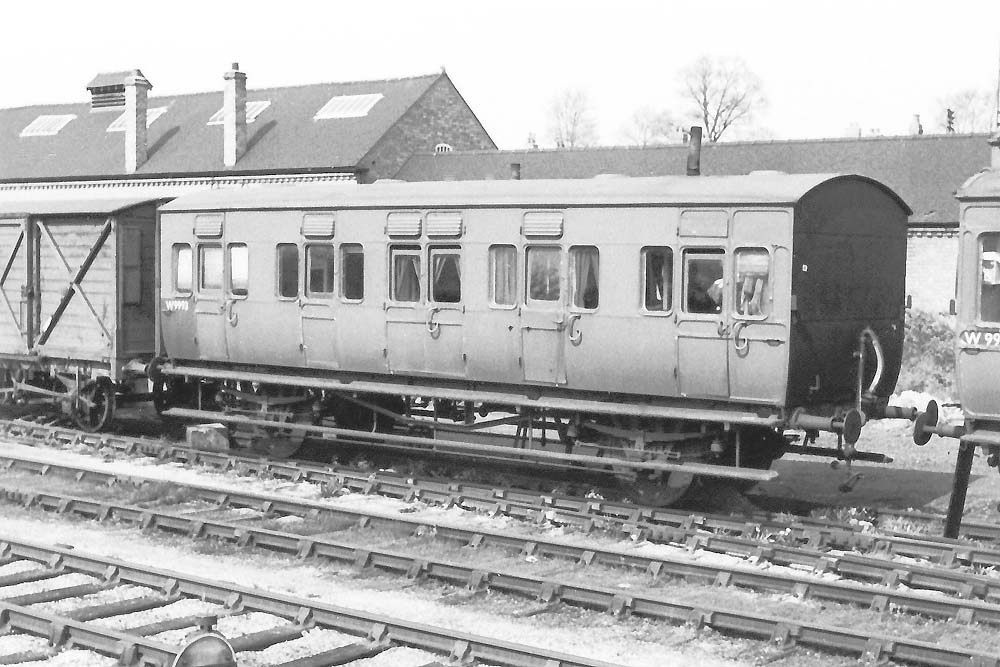 |
|
GWR Route: Banbury to Wolverhampton
Solihull Station: gwrs2631
 |
Ex-Great Western Railway four wheel Camping Coach No W9993
in the up sidings at Solihull Station on Saturday 19th April 1952. The coach
has been stopped on a switch, but a large block can be seen in the trackbed
behind the wheel of the coach nearest to the covered van. This coach was
originally a six wheeled 31 foot long 10 foot wide broad gauge luggage
composite coach built at Swindon to diagram U20 in May 1885 as part of lot 327
and numbered No 502. The coach was rebuilt as a six wheeled narrow gauge
composite coach in March 1892 with the carriage width reduced to 8 foot and
became No 889. In 1907 the Great Western Railway renumbered its coaching stock
giving each coach a four digit number with the first figure indicating the type
and as a composite, this coach became No 6889. Like the other diagram U20
coaches, No 6889 had oil lighting originally, but this was replaced initially
with flat flame gas burners and subsequently incandescent gas lighting was
installed in February 1913. By this time steam heating had also been provided.
In August 1922, No 6889 was altered to become a four wheel coach. This coach
was withdrawn from revenue earning passenger traffic and officially condemned
while at Barry in November 1931.
In 1934 the Great Western Railway introduced a Camp Coach
scheme with converted obsolescent coaches being located in station sidings at
nineteen locations providing bed and self-catering accommodation over the
summer months. In this first season the conversion expenditure was kept to a
minimum with the seat cushions in each compartment used as beds and additional
bunkbeds installed above. The original external compartment doors were the only
access to the sleeping compartments as no internal doors were provided. Three
compartments were converted to provide a communal area and adjoining kitchen
with basic facilities. There was no toilet or washing facilities available in
the coach, as it was expected that the local station facilities would be used.
In June 1934, the condemned coach No 6889 was converted at Swindon into a six
berth Camp Coach and became No 9993. After the success of the first holiday
season, these trial Camp Coaches were improved with internal access to the
sleeping compartments and box-spring mattress provided. These 6 berth coaches
were now referred to as the type B Camp Coach, as more types were introduced.
The cost of hiring a type B Camp Coach was £3 per week, plus an
obligation to purchase six rail tickets. The seasonal holiday locations of Camp
Coach No 9993 are not known, but Camp coach holidays continued until 1940
following the start of the Second World War in the previous year.
Camp Coaches were in demand as temporary accommodation by
the Government and Military, as well as the Railway Company. Coach No 9993 was
reported at the ex-MSWR Chiseldon station, south of Swindon on 21st September
1942, but had moved to the next station along the line (Ogbourne) by December
1942. In January 1945 it was allocated to Engineering Department at Oswestry.
After the war the coach was retain for departmental use although because this
was not an official allocation it never received the usual D prefix. The W
prefix to the number was added by British Railway and it is likely that coach
No W9993 was condemned in the mid 1950’s, but this information is not
recorded.
This photograph is displayed courtesy of the HMRS
(Historical Model Railway Society) and copies can be ordered directly from them
using the link HERE, quoting reference ABW611.
Robert Ferris
 back back

|
